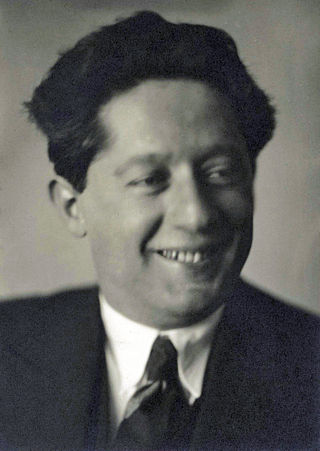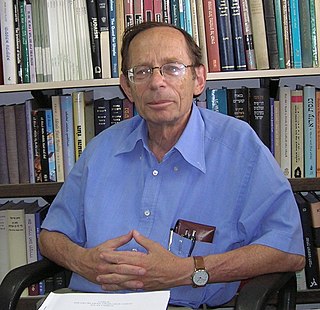Halakha, also transliterated as halacha, halakhah, and halocho, is the collective body of Jewish religious laws that are derived from the Written and Oral Torah. Halakha is based on biblical commandments (mitzvot), subsequent Talmudic and rabbinic laws, and the customs and traditions which were compiled in the many books such as the Shulchan Aruch. Halakha is often translated as "Jewish law", although a more literal translation might be "the way to behave" or "the way of walking". The word is derived from the root which means "to behave". Halakha not only guides religious practices and beliefs; it also guides numerous aspects of day-to-day life.

Rabbinic literature, in its broadest sense, is the entire spectrum of works authored by rabbis throughout Jewish history. The term typically refers to literature from the Talmudic era, as opposed to medieval and modern rabbinic writings. It aligns with the Hebrew term Sifrut Chazal, which translates to “literature [of our] sages” and generally pertains only to the sages (Chazal) from the Talmudic period. This more specific sense of "Rabbinic literature"—referring to the Talmud, Midrashim, and related writings, but hardly ever to later texts—is how the term is generally intended when used in contemporary academic writing. The terms mefareshim and parshanim almost always refer to later, post-Talmudic writers of rabbinic glosses on Biblical and Talmudic texts.

A yeshiva is a traditional Jewish educational institution focused on the study of Rabbinic literature, primarily the Talmud and halacha, while Torah and Jewish philosophy are studied in parallel. The studying is usually done through daily shiurim as well as in study pairs called chavrusas. Chavrusa-style learning is one of the unique features of the yeshiva.

Abraham Isaac Kook, known as HaRav Kook, and also known by the Hebrew-language acronym Hara'ayah, was an Orthodox rabbi, and the first Ashkenazi Chief Rabbi of British Mandatory Palestine. He is considered to be one of the fathers of religious Zionism and is known for founding the Mercaz HaRav Yeshiva.

Saul Lieberman, also known as Rabbi Shaul Lieberman or, among some of his students, the Gra"sh, was a rabbi and a Talmudic scholar. He served as Professor of Talmud at the Jewish Theological Seminary of America (JTSA) for over 40 years, and for many years was dean of the Harry Fischel Institute in Israel and also president of the American Academy for Jewish Research.

Meir Bar-Ilan was an orthodox rabbi, author, and religious Zionist activist, who served as leader of the Mizrachi movement in the United States and Mandatory Palestine. Bar-Ilan University, founded in 1955, was named in his honour.

Religious Zionism is a religious denomination that views Zionism as a fundamental component of Orthodox Judaism. Its adherents are also referred to as Dati Leumi, and in Israel, they are most commonly known by the plural form of the first part of that term: Datiim. The community is sometimes called 'Knitted kippah', the typical head covering worn by male adherents to Religious Zionism.

Shlomo Riskin is an Orthodox rabbi, and the founding rabbi of Lincoln Square Synagogue on the Upper West Side of New York City, which he led for 20 years; founding chief rabbi of the Israeli settlement of Efrat in the Israeli-occupied West Bank; former dean of Manhattan Day School in New York City; and founder and Chancellor of the Ohr Torah Stone Institutions, a network of high schools, colleges, and graduate Programs in the United States and Israel.
Torah Umadda is a worldview in Orthodox Judaism concerning the relationship between the secular world and Judaism, and in particular between secular knowledge and Jewish religious knowledge. The resultant mode of Orthodox Judaism is referred to as Centrist Orthodoxy.
Rosh Pina is a lay-led Modern Orthodox Jewish congregation and synagogue that meets in the Dupont Circle neighborhood of Washington, D.C., in the United States.

Kol Torah is a yeshiva in the Bayit Vegan neighborhood of Jerusalem.
Partnership minyan is a religious Jewish prayer group that seeks to maximize women's participation in services within the confines of Jewish law as understood by Orthodox Judaism. This includes enabling women to lead parts of service, read from the Torah, serve in lay leadership positions, sit in a more gender-balanced format, and in some cases count as part of a minyan ("quorum") of ten men and ten women. Partnership minyanim began in 2002 simultaneously in New York and Jerusalem, and have now spread to over 30 communities in at least five different countries around the world.
Zev Leff is an American-born Haredi rabbi, educator, author, and speaker. After serving as rabbi of the Young Israel of Greater Miami, Florida, for nine years, he and his family moved to Moshav Matityahu, Israel, in 1983, where he is the mara d'asra.

David Hanoch Yitzchak Bar-Hayim is an Israeli rabbi who heads the Shilo Institute, a Jerusalem-based rabbinical court and institute of Jewish education dedicated to the Torah of Israel.

Women rabbis and Torah scholars are individual Jewish women who are recognized for their studies of the Jewish religious tradition and often combine their study with rabbinical ordination. Ordination of women has grown since the 1970s with over 1,200 Jewish women receiving formal ordination. The majority of these women are associated with Progressive Jewish denominations. In Orthodox Judaism, the matter of ordination is more complex. Although a significant number of Orthodox women have been ordained as rabbis, many major Orthodox Jewish communities and institutions do not accept the change. In an alternative approach, other Orthodox Jewish institutions train women for various Jewish religious leadership roles and may entail training in Jewish Law although no formal rabbinic ordination is granted. Instead, alternate titles are used. Yet, despite this alteration in title, these women are often perceived as equivalent to ordained rabbis.

Rabbi Shaul Yisraeli was one of the leading rabbis of religious Zionism. He served as the rabbi of moshav Kfar Haroeh, as a Dayan in the Supreme religious court of Israel, as a member of the Chief Rabbinate Council, as Rosh Yeshiva in Mercaz HaRav, and as President of the Eretz Hemdah Institute. Rabbi Yisraeli was awarded the Israel Prize in Judaic Studies.
Yeshivat Maharat is a fringe and controversial Jewish educational institution in The Bronx, New York, which is the first Orthodox yeshiva in North America to ordain women. The word Maharat is a Hebrew acronym for phrase manhiga hilkhatit rukhanit Toranit, denoting a female "leader of Jewish law spirituality and Torah". Semikha is awarded to graduates after a 3- or 4-year-long program composed of intensive studies of Jewish law, Talmud, Torah, Jewish thought, leadership training, and pastoral counseling. The ordination functions as a credentialed pathway for women in the Jewish community to serve as clergy members.

Gerald Blidstein was professor emeritus of Jewish philosophy at Israel's Ben-Gurion University of the Negev. He was the Israel Prize laureate in Jewish philosophy (2006) and had been a member of the Israel Academy of Sciences since 2007.












